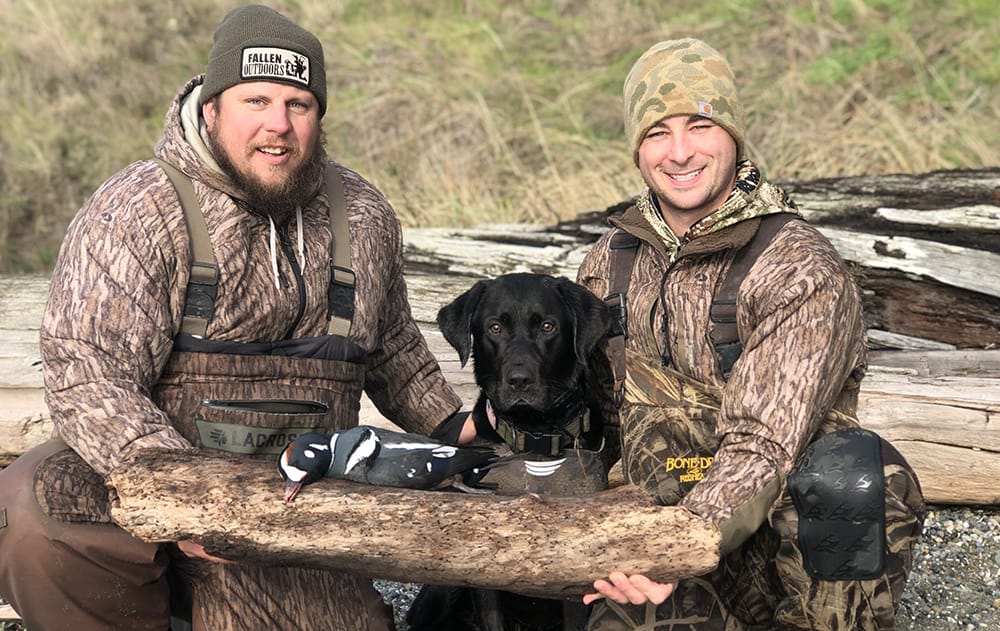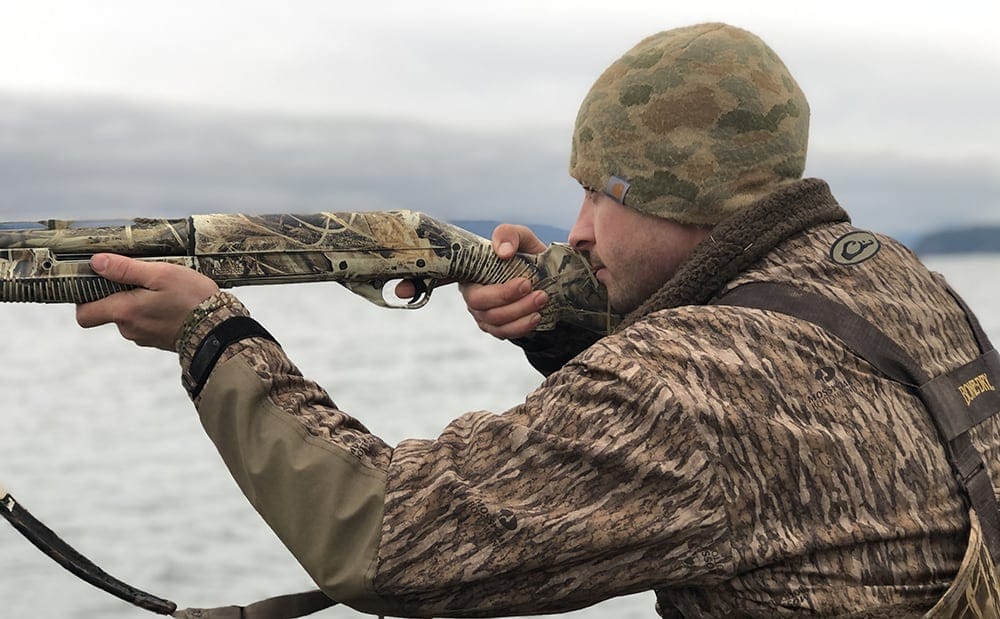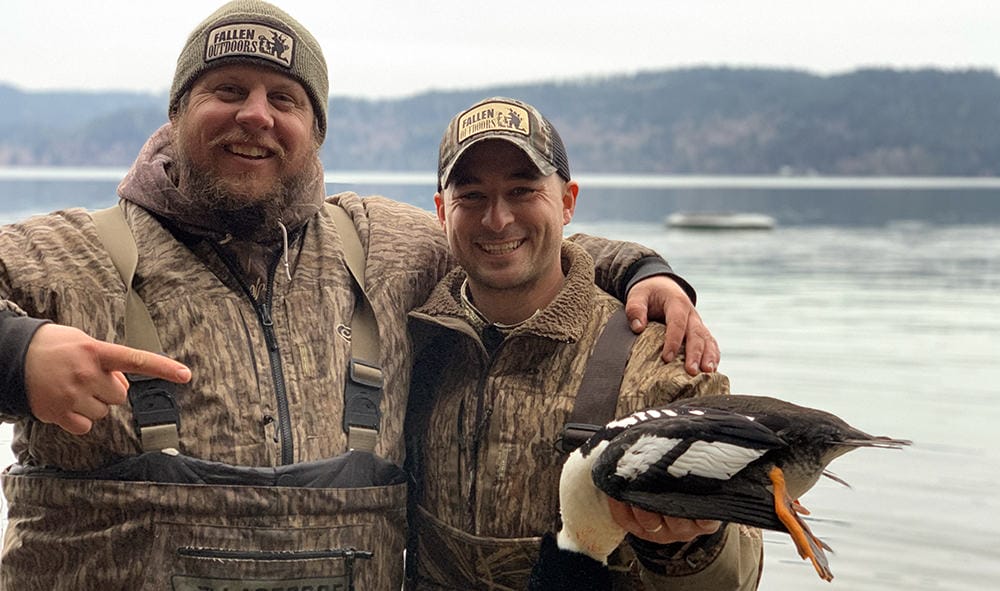A Brotherhood Built on the Outdoors Opens New Opportunities
by Kurt Beckstrom
On the shoreline of a small island in Puget Sound, off the coast of Washington State, two brothers searched the early-morning sky for an exceptional sea duck that relatively few waterfowlers get an opportunity to hunt. Bound not by blood but by shared life experiences, a deep love of the outdoors, and a calling to serve fellow human beings, the men were on a quest to harvest one’s first Pacific harlequin drake.

(L-R) Eric Bakken helps Sam Phipps harvest his first Pacific harlequin drake.
“Washington is one of a couple of places (Alaska being the other) where a hunter has a good opportunity to collect a harlequin duck,” said Eric Bakken, events coordinator for the Union Sportsmen’s Alliance and founder of The Fallen Outdoors (TFO) organization. The Washington resident says the state allows a hunter to take just one harlequin per year. His goal on that day was to put his longtime friend, USA Conservation Programs Manager Sam Phipps, in a position to harvest one of the strikingly colorful birds.
“Eric invited me several times to join him on a sea duck hunt, and when I finally got to make the trip, the hunt couldn’t have followed his script any better,” Phipps said. “We were sitting on the shore with two lines of decoys—a dozen dekes in each string—stretching out into the water. Eric had explained that ducks passing by the island would spot the decoys and swing in close enough for a shot. When it happened, things got real in a big hurry.”
Instead of going with the typical sea duck set-up that has shooters in individual layout boats with a tender boat hidden nearby, the pair chose to hunt from solid ground so they could easily communicate, and, more importantly, share the experience side-by-side.
“I’d settled on a spot where I take only my closest friends,” Bakken said, “and told Sam beforehand that we’d hunt from shore, so I could be right there when he shot his first harley. I warned him that it could take three hours or a half-day instead of the typical 20 minutes, but he was all for it.”
Fellow Vets and Union Brothers
Phipps, who lives in Missouri, and Bakken became co-workers and union brothers through their employment at the USA a few years ago, but the roots of their friendship stretch much farther. They reach back to their military days while stationed at Fort Lewis army base located on the southern tip of Puget Sound. They met through a mutual acquaintance and became fast friends over a shared interest in hunting and fishing.
“We’d both gone to war for our country more than once,” Bakken said, “and we both love the outdoors and have strong convictions about conserving natural resources, so we hit it off pretty quickly. We met just two years after I started TFO with a couple buddies, and Sam began helping with coyote and turkey hunts almost immediately.”
A loose organization at the beginning, The Fallen Outdoors was meant to help veterans and active-duty service members enjoy the outdoors. “My buddies and I actually came up with the idea during our downtime on a mountain top in Afghanistan,” Bakken explained. “It was just going to be a way to showcase vets who love to hunt and fish, but it spiraled from there. It became more about therapy, healing, camaraderie, and the power of the outdoors in helping vets find their way back after life in the military.”
Today TFO is a national non-profit organization with chapters in 42 states. Though Bakken has since handed off the operational reins, he remains active in the organization as a speaker, motivator, and hunt host.
“Eric invested 10 years of his life building TFO, and without him, it wouldn’t exist,” said Branden Trager, TFO President and retired Army Sergeant First Class. “Today we have 60,000 active members from all branches of the service and reach nearly 200,000 on social media, all with an unpaid, volunteer staff.”
Distance Doesn’t Matter
Sam Phipps entered the Veterans in Piping training program while still at Fort Lewis. Little more than a year after he and Bakken met, he was off to Missouri to begin a career as a union pipefitter. Now, though separated by 2,000 miles of prairie land and mountain ranges, their bond is as strong as ever. And that bond is what brought them to a spot on that island.
“Eric had explained how harlequins fly in tight flocks,” said Phipps, “and that I’d have to pick my shot at a drake. We watched buffleheads zip by the decoys for a while; then the harlequins arrived.”
It was a small flock of six or seven ducks that flew nearly wingtip to wingtip, Phipps recalled. As Bakken predicted, they wheeled close to shore when they saw the decoys.
“I heard Eric whisper to take the last bird in the flock,” Phipps said. “They were extremely tight over the left string flying toward the right. Just as I was beginning to doubt I’d get a clean shot, the last duck fell back a little and lost altitude—like it was committed to the decoys. It was just enough to give me a clean 25-yard chip shot, and the drake fell.”

“Harlequins are small as ducks go, but taking your first mature drake is a momentous achievement for any waterfowler,” Bakken said. “And though the bird dropped nearly in our laps, Sam wanted my dog Sarge to fetch it. He probably makes 1,500 retrieves a year for vets I take duck hunting, and Sam wanted him to have the honor of collecting his first harlequin.”
After a short celebration that, as Phipps tells it, was probably heard in the next county, the pair sat there for another hour just appreciating the bird, the hunt, and each other’s company.
“I was over the moon,” Phipps said, “just being there with Eric, and having him—one of my closest friends—put us on the spot to make this dream come to life. It was incredible.”
Over the next couple of days, the pair focused on other sea duck species, and Phipps was able to collect fine examples of a white-winged scoter drake, surf scoter drake, as well the often-challenging Barrow’s goldeneye.
“Going out and getting all these species that I’d never seen in person before—it was unbelievable,” Phipps said. “And the action was nonstop. Even Eric said it was the best couple of days of shooting he’d ever seen. For him to say that means something because he knows what he’s doing.”
Connections Are What Count

(L-R) Eric Bakken and Sam Phipps are bound by shared life experiences and a deep love of the outdoors.
Because of a strong personal connection with a co-worker and fellow hunter, Phipps experienced a dream sea duck hunt half a continent away from his home—an opportunity that otherwise wouldn’t have been possible. It’s something anyone can do, and both he and Bakken recommend exploring the possibilities if you’re looking for a new adventure in a new place.
“Every union member probably knows at least a few other union folks scattered across the country,” Bakken said, “and those connections could lead to a memorable hunting or fishing trip together.”
“Union life offers the same sense of camaraderie Eric and I had when we were in the army,” added Phipps. “Everyone looks out for each other, and you always have somebody you can count on—on or off the job site.”
If you’re currently without such a connection, the USA Community Facebook page is a good place to find one. “It’s where union members not only swap news and photos but can get to know each other, and maybe end up sharing an outdoor experience,” Bakken said.
Union members who are also military veterans (of any branch or generation) can check out The Fallen Outdoors on Facebook, as well, for news about upcoming outdoor adventures or to offer to host a trip for fellow vets.
As with most things in life, it’s often who you know that helps most when it comes to nailing down that trip you’ve always dreamed of.







